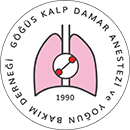

Effect of Age on Estimated Glomerular Filtration Rate and the Relationship between eGFR and Extubation Time in Patients Undergoing Open Heart Surgery
Feyza Çalışır1, Yavuz Orak1, Süleyman Alper Kozak1, Ziya Kurşun1, Sefa Mert Alkan1, Abdulhamit Şehid Kılınç1, Adem Doğaner21Department of Anesthesiology and Reanimation, Kahramanmaraş Sütçü İmam University Faculty of Medicine, Kahramanmaraş, Türkiye2Department of Biostatistics, Kahramanmaraş Sütçü İmam University Faculty of Medicine, Kahramanmaraş, Türkiye
Objectives: Extracorporeal circulation, while facilitating coronary artery bypass grafting (CABG) surgery, accelerates inflammatory processes and increases morbidity and mortality in elderly patients. The primary aim of this study was to evaluate the effect of aging on postoperative renal function after open heart surgery using an estimated glomerular filtration rate (eGFR) biomarker. The secondary aim was to evaluate the relationship between postoperative extubation times and other laboratory parameters and age and eGFR.
Methods: The data of 90 patients in the American Society of Anesthesiologists score (ASA) III groups who underwent CABG with cardiopulmonary bypass under general anesthesia were retrospectively analyzed. Patients were divided into two groups according to age (Group 1 aged ≥65 years and Group 2 aged <65 years). Statistical differences between the groups were evaluated according to the eGFR of the patients (eGFR <60 and >60 mL/min).
Results: The number and percentage of patients with preoperative eGFR <60 mL/min were similar in both groups (p=0.052). However, the number and percentage of patients with eGFR <60 mL/min postoperatively were higher in Group 1 than in Group 2 (p=0.024). Extubation times were found to be higher in Group 1, with 540 and 390 min in Groups 1 and 2, respectively (p=0.002).
Conclusion: The results of this study show that the renal and pulmonary systems of patients aged ≥65 years will be more affected by cardiovascular surgery and anesthesia than those of patients aged <65 years. In CABG surgery, we can obtain an idea about the postoperative extubation time by monitoring preoperative and postoperative eGFR changes.
Keywords: Aging, airway extubation, coronary artery bypass, creatinine, glomerular filtration rate
Manuscript Language: English
(379 downloaded)

















